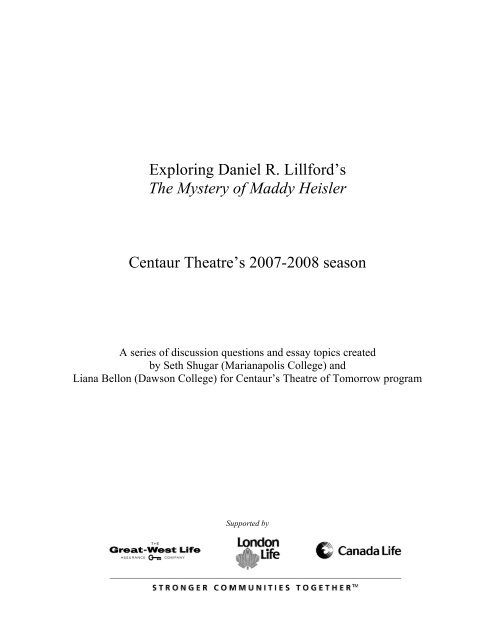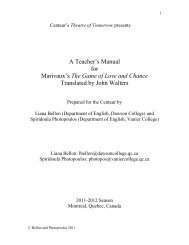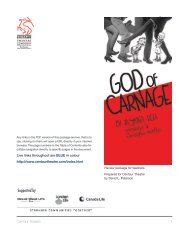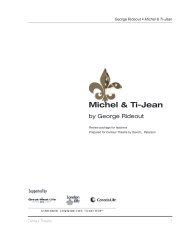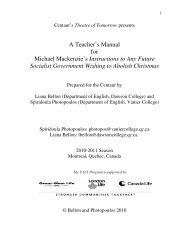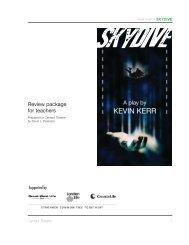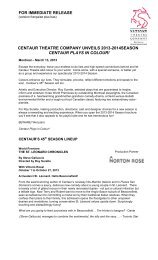Exploring Daniel R. Lillford's The Mystery of Maddy - Centaur Theatre
Exploring Daniel R. Lillford's The Mystery of Maddy - Centaur Theatre
Exploring Daniel R. Lillford's The Mystery of Maddy - Centaur Theatre
Create successful ePaper yourself
Turn your PDF publications into a flip-book with our unique Google optimized e-Paper software.
<strong>Exploring</strong> <strong>Daniel</strong> R. Lillford’s<br />
<strong>The</strong> <strong>Mystery</strong> <strong>of</strong> <strong>Maddy</strong> Heisler<br />
<strong>Centaur</strong> <strong>The</strong>atre’s 2007-2008 season<br />
A series <strong>of</strong> discussion questions and essay topics created<br />
by Seth Shugar (Marianapolis College) and<br />
Liana Bellon (Dawson College) for <strong>Centaur</strong>’s <strong>The</strong>atre <strong>of</strong> Tomorrow program<br />
Supported by
SYNOPSIS<br />
As <strong>Daniel</strong> Lillford explains in his author’s note, while the play is “entirely a work <strong>of</strong> fiction” it is “in<br />
part based on rumors <strong>of</strong> fifth columnists who spied for Nazi Germany while living in Lunenberg<br />
County, Nova Scotia during those dark days when the world was at war.” A fifth column is an<br />
organization <strong>of</strong> individuals who seek to undermine a larger group.<br />
While set in the present, Lillford’s play is organized through a series <strong>of</strong> flashbacks that allow us to<br />
discover the controversial mystery <strong>of</strong> <strong>Maddy</strong> Heisler. In present day Nova Scotia, Jacob Meisner, an<br />
aging detective fiction writer, begins to wonder if the ghost <strong>of</strong> <strong>Maddy</strong> Heisler, his first love, is<br />
haunting him. <strong>Maddy</strong> was discovered to be a Nazi spy and Jacob’s long-concealed secret about his<br />
romantic relationship with her creates tension in his home and community. When Ingrid, <strong>Maddy</strong>’s<br />
granddaughter, arrives, Jacob is shown a journal that helps him reconcile himself with the past.<br />
Lillford’s play also explores the process <strong>of</strong> writing. Criticized by Myrtle for having flat female<br />
characters, Jacob desperately needs to rekindle his writing. <strong>The</strong> play implies that his inspiration may<br />
lie in his suppressed memories <strong>of</strong> <strong>Maddy</strong> Heisler and the difficult ethical decisions he made during the<br />
summer <strong>of</strong> 1942.<br />
CAST OF CHARACTERS:<br />
Jacob Meisner is a South Shore native from Nova Scotia in his early seventies.<br />
He also appears as a seventeen-year old army recruit.<br />
Myrtle Kelly is an African-Canadian Nova Scotian in her fifties.<br />
Earle Murphy is a South Shore native from Nova Scotia in his early seventies who also<br />
appears as a seventeen-year old army recruit.<br />
<strong>Maddy</strong> Heisler is an attractive German woman in her thirties<br />
Ingrid Traeger, also in her her thirties, bears a striking resemblance to <strong>Maddy</strong> Heisler and, we<br />
discover, is her granddaughter.
THEMES:<br />
1. Racism and anti-Semitism<br />
2. Reason and logic versus superstition and religion<br />
3. Power <strong>of</strong> the past and memories (the past haunting the present)<br />
4. Creativity and inspiration<br />
5. History vs. historiography (the awareness that historical accounts are not entirely objective)<br />
6. Love versus infatuation<br />
7. Forgiveness and the reluctance to forgive<br />
8. Moral absolutism vs. Relativism<br />
9. Slipperiness <strong>of</strong> identity<br />
10. Manipulation<br />
11. Ethical dilemmas<br />
12. <strong>The</strong> potential positives in negative situations<br />
13. Falling in love with ‘the enemy’<br />
RESEARCH TOPICS:<br />
1. Fifth columnists who spied for Germany while living in Nova Scotia during the Second World<br />
War<br />
2. <strong>The</strong> biblical significance <strong>of</strong> Jacob’s name<br />
3. What was “Jacob’s Ladder”?<br />
4. Basic facts about World War II<br />
5. Africville, Halifax (a displaced African community)<br />
6. German U-Boats<br />
7. Mata Hari, a famous spy<br />
8. Personal accounts <strong>of</strong> WWII by veterans<br />
LITERARY TERMS:<br />
<strong>The</strong> following terms are useful when engaging in a literary analysis. <strong>The</strong> definitions are taken from<br />
M.H. Abrams’s Glossary <strong>of</strong> Literary Terms (New York: Harcourt Brace, 1993).<br />
1. Figurative language: Figurative language “is a departure from what users <strong>of</strong> the language<br />
apprehend as the standard meaning <strong>of</strong> words, or the standard order <strong>of</strong> words, in order to<br />
achieve a special meaning or effect” (Abrams 66). <strong>The</strong>re are three types <strong>of</strong> figurative<br />
language: similes, metaphors, and personification.<br />
a) Simile: “In a simile, a comparison between two distinctly different things is indicated<br />
by the word ‘like’ or ‘as’” (Abrams 67).
) Metaphor: “In a metaphor, a word or expression which in literal usage denotes one<br />
thing or action is applied to a distinctly different kind <strong>of</strong> thing or action, without<br />
asserting a direct comparison” (Abrams 67). Simply put, a metaphor is different than a<br />
simile because it does not establish a comparison by using the words ‘like’ or ‘as.’<br />
c) Personification: Personification refers to the technique <strong>of</strong> describing an inanimate<br />
object, an animal, or an abstract concept “as though it were endowed with life or with<br />
human attributes and feelings” (Abrams 69).<br />
Note that figurative language is also referred to as imagery. <strong>The</strong> two terms can be used<br />
interchangeably. However, imagery is a more general term that refers not only to similes,<br />
metaphors, and personification, but simply to all the evocative, poetic images a writer<br />
creates.<br />
2. <strong>The</strong>me: A theme is a central idea or concept that is developed throughout a work <strong>of</strong> literature.<br />
That said, each piece <strong>of</strong> literature <strong>of</strong>ten has as many different themes as there are readers who<br />
interpret the work. When asserting that a work has a particular theme, be sure to refer to<br />
textual details and cite from the text to support your argument.<br />
3. Symbol: “In the broadest sense, a symbol is anything which signifies something; in this sense<br />
all words are symbols. In discussing literature, however, the term ‘symbol’ is applied only to<br />
a word or phrase that signifies an object or event which in its turn signifies something or has a<br />
range <strong>of</strong> references beyond itself” (Abrams 206).<br />
DISCUSSION QUESTIONS and/or ESSAY TOPICS<br />
1. Jacob rejects the idea that there is absolute good and absolute evil. Do you believe in moral<br />
absolutes? Lillford’s play presents us with complex characters. For example, Angus, while a war<br />
hero fighting the fascists, is also a bigot, and <strong>Maddy</strong>, although a Nazi spy, expresses rather<br />
modern views about women’s roles. How does Lillford complicate notions <strong>of</strong> ‘good’ and ‘evil’?<br />
Discuss Angus and <strong>Maddy</strong>.<br />
2. Why are the female characters Jacob creates “weak, sickly sweet, flat, vanilla donut woman,” as<br />
Myrtle says? Is this tendency related to his inability to come to terms with the unpalatable side <strong>of</strong><br />
<strong>Maddy</strong>’s character? Myrtle tells Jacob “How can you expect others to read what ain’t got no soul<br />
in it to begin with”? What does she mean by soul? Myrtle also declares Jacob is “out <strong>of</strong> touch.”<br />
What is he out <strong>of</strong> touch with? Is his inability to write well related to his reluctance to tell the story<br />
<strong>of</strong> <strong>Maddy</strong> Heisler?<br />
3. Should a creative writer write for a particular audience? Does thinking <strong>of</strong> our audience prompt<br />
or inhibit our creativity? Myrtle criticizes Jacob for not writing for “anyone but himself.” Should<br />
writers write for anyone but themselves?
4. <strong>The</strong> epigraph Lillford uses for his play comes from the long, late-fourteenth-century poem Sir<br />
Gawain and the Green Knight:<br />
For long they laughed and played<br />
Till she gave him a gracious kiss.<br />
A fond farewell she bade,<br />
And went her way on this.<br />
One <strong>of</strong> the most well known Middle English romances, the long poem pits good against evil.<br />
While Sir Gawain symbolizes truth and valour, the green knight is associated with duplicity<br />
and cunning. <strong>Maddy</strong> repeatedly refers to Jacob as her “little green knight.” What light do<br />
these references to Sir Gawain and the Green Knight cast on the central themes <strong>of</strong> the play?<br />
5. <strong>The</strong> play opens to Sergey Prok<strong>of</strong>iev’s “<strong>The</strong> Year 1941, Op. 90, In the Night.” Prok<strong>of</strong>iev, a<br />
Russian composer <strong>of</strong> operas, ballets and chamber music, was evacuated from the Soviet Union<br />
when Germany attacked in 1941. What mood does the piece evoke? Does knowing the piece<br />
and its context add to your experience <strong>of</strong> the play?<br />
6. In her seminal 1963 essay “Eichmann in Jerusalem,” Hannah Arendt coins the influential<br />
phrase “the banality <strong>of</strong> evil” to describe moral monsters such as prevalent figures in the Nazi<br />
regime who, in spite <strong>of</strong> the fact they had committed atrocities, had ordinary and common<br />
personalities and loved their families. She rejects the notion that perpetrators <strong>of</strong> heinous<br />
crimes were psychopaths. Ingrid, <strong>Maddy</strong>’s granddaughter, states that “a lot <strong>of</strong> people died<br />
because <strong>of</strong> <strong>Maddy</strong>’s activities. Many ships [were] blown up by the wolf packs.” Is <strong>Maddy</strong> evil<br />
or, as Arendt suggests, is she an embodiment <strong>of</strong> the banality <strong>of</strong> evil? Put yourself in Jacob’s<br />
position. He puts his country and friends at risk by saving <strong>Maddy</strong> and delivering her back to<br />
the Germans. Would you have done the same? Ought personal love relationships trump<br />
national duties?<br />
7. <strong>The</strong>re are a number <strong>of</strong> indications that racism is still prominent in Jacob’s community.<br />
Angered by Jacob’s interracial relationship, Angus, an old war buddy <strong>of</strong> Jacob’s and a member<br />
<strong>of</strong> the Ku Klux Klan, once planted a cross in Jacob and Myrtle’s front yard. Jacob reminds<br />
Earle that he “let it happen” because “in [his] heart, like [Angus’] heart, [he’s] a racist son <strong>of</strong> a<br />
bitch.” Jacob also states that if a man crosses the street because <strong>of</strong> the colour <strong>of</strong> someone’s<br />
skin “that says more than any words ever will.” As well, much to Jacob’s frustration, Earle<br />
rationalizes his wife Greta’s behaviour by saying “it’s just the goddamn way she is,” and says<br />
she “can’t change that.” Various questions arise from these details.<br />
a. Do you agree that racism cannot be changed? Is contemporary Canadian society still<br />
haunted by the racism that afflicts many <strong>of</strong> the characters in the play? In the play, are<br />
there many differences in the social views expressed in the 1940s scenes and the<br />
present-day ones?<br />
b. How is Jacob a non-conformist? Discuss his rebellious character and his rejection <strong>of</strong><br />
racism and conventional marriage. Is Jacob’s relationship with Myrtle, a victim <strong>of</strong><br />
racism, compensation for the guilt he feels for having been attracted to <strong>Maddy</strong>, a<br />
racist?<br />
c. Despite the play’s rejection <strong>of</strong> racism, do you find the character <strong>of</strong> Myrtle is presented<br />
as a stereotype or stock character?
8. Myrtle is superstitious and, while he is initially not superstitious, Jacob begins to echo<br />
Myrtle’s views when he says “one crow in the poplar” after he sees Ingrid who he thinks is<br />
<strong>Maddy</strong>. Discuss omens. Why are birds <strong>of</strong>ten omens? In Shakespeare’s Hamlet, we are told<br />
that there is providence in the fall <strong>of</strong> a sparrow. Find other expressions that reference omens.<br />
9. Earle complains about the lack <strong>of</strong> history being taught in school. Does the play redress this<br />
situation?<br />
10. Since <strong>Maddy</strong> seems to appear in Jacob’s present day situation, Lillford implies Jacob is<br />
experiencing a blurring <strong>of</strong> past and present. What does this suggest about Jacob’s state <strong>of</strong><br />
mind?<br />
11. Research other books, movies, and plays which explore the theme <strong>of</strong> falling in love with ‘the<br />
enemy.’<br />
CLASSROOM ACTIVITIES:<br />
1. In <strong>Lillford's</strong> play, Ingrid is able to explore her family's history because <strong>of</strong> the book, or journal,<br />
her grandmother leaves behind. Often, our anecdotal family history is not recorded by elderly<br />
relatives and, as a result, details <strong>of</strong> our family's past are forever lost. In an attempt to recapture<br />
your family's history, interview your older relatives, such as aunts, uncles, and grandparents.<br />
Prepare the questions in advance with your teacher and classmates. You might want to consider<br />
recording the interviews so that you can enjoy the conversation. This way, you will also have a<br />
record <strong>of</strong> your relatives' voices.<br />
After the interview, your teacher may ask you to choose the most detailed responses and present<br />
them to the class or you may be asked to write about one family member's memories or<br />
history using the details that surfaced in the interviews.<br />
2. Having a good grasp <strong>of</strong> major historical events and when they occurred is crucial not only for<br />
your future studies but for your understanding <strong>of</strong> world history and your general knowledge.<br />
World War II began in 1939 and ended in 1945. Commit these dates to memory. As a class,<br />
create a timeline <strong>of</strong> key events in the twentieth century and quiz each other until you feel confident<br />
you have retained the dates and understood the main aspects <strong>of</strong> the events. Be sure to include the<br />
following and feel free to add specifically Canadian events as well:<br />
-Death <strong>of</strong> Queen Victoria<br />
-Women given the right to vote (dates vary depending on country)<br />
-<strong>The</strong> Wright Brothers’ first flight<br />
-Albert Einstein publishes his Special <strong>The</strong>ory <strong>of</strong> Relativity<br />
-World War I<br />
-Russian Revolution<br />
-In India, Gandhi peacefully demands Indian independence<br />
-<strong>The</strong> Depression<br />
-<strong>The</strong> Spanish Civil War<br />
-World War II
-<strong>The</strong> Cold War<br />
-<strong>The</strong> Vietnam War<br />
-Assassination <strong>of</strong> President John F. Kennedy<br />
-Canada’s Jubilee Celebration<br />
-Astronaut Neil Armstrong is the first man on the moon<br />
-Fall <strong>of</strong> the Berlin Wall<br />
3. Append a scene to <strong>Lillford's</strong> play. Working in groups <strong>of</strong> four, write a five-minute script which<br />
you will then perform in front <strong>of</strong> the class. <strong>The</strong> scene might be a flashback involving <strong>Maddy</strong> and<br />
Jacob or it might be a scene set in Jacob's present-day community or home. <strong>The</strong> scene could be<br />
added at the end <strong>of</strong> the play or at any other point. Before you perform your scene, be prepared to<br />
explain where the scene is being inserted and why.


